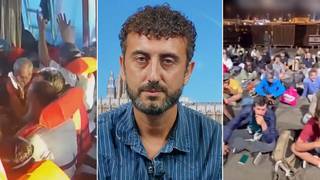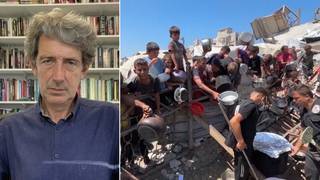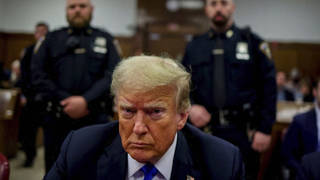
Guests
- Wayne Barrettinvestigative reporter who wrote for The Village Voice for 37 years. His 1991 biography of Donald Trump was just republished as an ebook with the title of Trump: The Greatest Show on Earth: The Deals, the Downfall, the Reinvention.
With the Republican National Convention opening in Cleveland in less than two weeks, the party’s presumptive nominee, Donald Trump, is facing a new wave of controversies, from Trump’s tweeting of an anti-Semitic image showing Hillary Clinton against a backdrop of cash and a Star of David to his joke about Mexico attacking the United States. We spend the hour with Trump biographer Wayne Barrett, author of “Trump: The Greatest Show on Earth: The Deals, the Downfall, the Reinvention.” Barrett has been reporting on Trump since the 1970s. We begin by talking about Trump’s close relationship with the late Roy Cohn, who once served as a top aide to the red-baiting Senator Joseph McCarthy.
Transcript
AMY GOODMAN: With the Republican National Convention opening in Cleveland in less than two weeks, the party’s presumptive presidential nominee, Donald Trump, is facing a new round of controversies. On Saturday, his campaign tweeted an image showing Hillary Clinton, a pile of $100 bills and six-pointed stars shaped like the Star of David, along with the words “Most Corrupt Candidate Ever!” The tweet immediately drew criticism for being anti-Semitic. Trump later deleted the tweet, then retweeted the same image, but with the star replaced by a circle. The original image shared by the presumptive Republican presidential candidate came from a Twitter user whose feed includes a number of violent and offensive images of African Americans, Muslims and immigrants. This comes as the Council on American-Islamic Relations is warning Donald Trump’s comments are putting Muslim women in danger after his comments last week at a town hall when he was questioned by a supporter about Muslims working for the TSA.
TRUMP SUPPORTER: Just to mix quickly homeland security and jobs. Why aren’t we putting our retiree—our military retirees on that border or in TSA? Get rid of all these “hibijabis” they wear at TSA.
DONALD TRUMP: Well, I—
TRUMP SUPPORTER: I’ve seen them myself.
DONALD TRUMP: Yeah, I understand that. Yeah.
TRUMP SUPPORTER: We need the veterans back in there to take it. They’ve fought for this country and defended it. They’ll still do it.
DONALD TRUMP: OK.
TRUMP SUPPORTER: Thank you.
DONALD TRUMP: You know, and we are looking at that. And we are looking at that. We’re looking at a lot of things.
AMY GOODMAN: At that same town hall in New Hampshire, Donald Trump joked about Mexico attacking the United States.
DONALD TRUMP: Mexico—and I respect Mexico. I respect their leaders. What they’ve done to us is incredible. Their leaders are so much smarter, so much sharper. And it’s incredible. In fact, that could be a Mexican plane up there. They’re getting ready to attack.
AMY GOODMAN: We turn now to Part 2 of our in-depth look at Donald Trump. Last week, Democracy Now!'s Juan González and I visited Wayne Barrett, considered the preeminent journalist on Donald Trump. He has been tracking Trump for decades. His 1991 biography of Donald Trump was just republished as an ebook with the title Trump: The Greatest Show on Earth: The Deals, the Downfall, the Reinvention. On Thursday, we aired Part 1 of the interview. Today we bring you Part 2 for the hour. We visited Wayne Barrett at his home. He talked about Trump's longtime lawyer and mentor, Roy Cohn, who once served as a top aide to the red-baiting Senator Joseph McCarthy.
WAYNE BARRETT: I knew Roy Cohn. I knew him very well. And you just cannot understand how Donald could have been this close. I write in the book that they talked 15 times a day. One of the two stories here—I can’t remember which one—said it was five times a day. It’s probably somewhere in between. Roy himself told me they talked 15 times a day. But there’s no question that next to Fred Trump, Roy Cohn was the single greatest influence in Donald’s life. And Roy is incandescent evil. I mean, I would sit with him, and I—you know, it was enough to make you rush back to church, the Satanic feeling that he would give you. He would eat with his fingers. And we would be at 21. He would eat with his fingers. He would—he carried a little glass in his jacket that he would take out and drink in this little glass. He would pop a white pill when he didn’t think you were looking. And he—his house was filled with frogs. He was the weirdest guy. He was into the strangest stuff. He was a chicken hawk after little boys, and yet he was the most virulently anti-gay guy you could imagine. And so, that was Donald’s mentor and constant sidekick, who represented all five of the organized crime families in the City of New York.
AMY GOODMAN: For young people who don’t know Roy Cohn’s background, back to McCarthy—
WAYNE BARRETT: Yeah.
AMY GOODMAN: —can you explain who he is and what it meant for Donald Trump to learn at his knee?
WAYNE BARRETT: Yeah, well, he starts out as—I think he was 23 years old when he was the chief counsel to Joe McCarthy doing all those hearings. He was extremely wired into the Reagan White House. He helped make Donald Trump’s sister Maryanne a federal judge in 1983. He was the ultimate fixer power player in New York for a whole period of time. He died of AIDS in 1986. But for a particular block of time, he was extremely influential with the Beame administration, because, even more so than Fred Trump, he was totally wired into Abe Beame, because he had knocked Mario Biaggi out of the race. Mario Biaggi was a very popular, charismatic congressman from the Bronx. And Roy leaked that he had been before a federal grand jury. And initially Biaggi denied it, and ultimately it was established that he had been. And that’s why he couldn’t run. And that was Roy getting Biaggi out of the race for Beame. So Beame was incredibly beholden to him. So he had enormous influence in the city underground.
I would write stories about his parking lots. Strangely enough, his cash cow was city-owned parking lots by the water, which were leased by the Bureau of Marine and Aviation, and he controlled the companies that had the parking lots that were city-owned. And it was just an enormous amount of money. He never paid any taxes. He pretended to have no income. He had an incredible cash empire. And the guy who actually leased those parking lots to him, Rick Mazzeo, wound up under federal investigation, and they found his body in the trunk of a car. And all he did was give parking lots to Roy Cohn. That’s what he did for a living.
And so, you just look at the—as I said, you know, he was the middle man between Donald and all these mob guys. You asked about the apartments at Trump Tower. John Cody gets an apartment at Trump Tower. John Cody is a Gambino crime family associate who I had lunch with while I was doing the book. I had lunch with him at Windows on the World. And—
AMY GOODMAN: On top of the World Trade Center.
WAYNE BARRETT: Yes. And it must have been under federal surveillance, because, two weeks after the lunch, they busted him for trying to kill the guy who—Bobby Sasso, who had taken over Local 282, which was his union. That was the concrete delivery men. They delivered all the concrete to all the sites in New York, totally mob-controlled. And so they busted him for trying to kill a guy. He had already been in jail. He goes back to jail. Well, he had a—he denied it was a mistress, but he certainly told me that they were very close, Verina Hixon. I talk about her in the book. She got not only an apartment in Trump Tower, it’s the only apartment with a pool. It’s right underneath Donald’s apartment, right? And all of it built for John Cody, because Trump Tower is a total concrete structure. It was the first concrete structure like that built in New York. So, John Cody had complete control over this. And so he gets this apartment. He actually invested in the apartment himself, as I established in the book. And Verina Hixon is there, who I met with a few times. She used to meet me in Central Park. She didn’t want to meet me in Trump Tower. But we talked many times. And, you know—and there’s John hanging out in Trump Tower all the time, right underneath Donald Trump’s apartment. And he’s a total wise guy. He’s a total wise guy. And, you know, he said to me—
AMY GOODMAN: You mean by that a mob guy.
WAYNE BARRETT: Yeah. He said to me, “Oh, I always used Roy as the go-between with Donald. Roy was the guy who—Roy Cohn was the guy who set us up.” You know, so this is the relationships that flowed through—you know, the FBI did an affidavit saying that the heads of—the commission, the heads of the five crime families, would meet in Roy Cohn’s office, because the government couldn’t eavesdrop. It was a lawyer-client relationship. That’s what they did.
JUAN GONZÁLEZ: And you’re talking here about the five families in New York, but, of course, Donald Trump’s signature developments occurred in Atlantic City, where, as I recall, the Philadelphia mob was in charge of whatever happened in Atlantic City. Can you talk about his relationship there in Atlantic City?
WAYNE BARRETT: Yeah, well, no question. I mean, Nicky Scarfo—
JUAN GONZÁLEZ: Nicky Scarfo.
WAYNE BARRETT: Nick Scarfo, that’s the bloodiest crime family in the history of the United States. It’s undervalued because it wasn’t based in New York. It didn’t get the coverage, you know? But they controlled Local 54, which was the hotel workers’ union. This is not me talking, this is a finding in federal court, that Nicky Scarfo controlled the hotel workers’ union. And when they would strike all the casinos in Atlantic City, they wouldn’t strike Donald. You know, when he first goes down there into Atlantic City to acquire his first parcels, he buys them at a premium, overpays, from underbosses of the Nicky Scarfo crime family. He has a relationship with these guys throughout the early days of his time down there. And it’s—it was really a pretty remarkable set of deals that he did. Now, you had—Mike Matthews was the mayor of Atlantic City, who was totally—proven in court, went to jail—totally owned by the Nicky Scarfo crime family. And he was Donald’s number one ally. They were feeding him money, contributions, illegal contributions, but they were feeding Matthews money. And that’s just one part of this intricate relationship that gave birth to Donald’s casino empire in Atlantic City.
AMY GOODMAN: Can you talk about this casino empire and what it meant? You actually, unlike most people in this country, got to see Donald Trump’s tax records?
WAYNE BARRETT: Yeah, I did. I did.
AMY GOODMAN: How did you get to? Because he’s refusing to reveal them.
WAYNE BARRETT: Well, they were—they were part of the record of the Casino Control Commission in the '70s. He would have to submit his tax returns for the first casino that he did down there, at least, Trump Plaza. I mean, one of the great ironies is that his second casino, Trump Castle, was actually built by the Hiltons. And the Hilton family, out of Chicago, was denied a license by the Casino Control Commission, which was all done to benefit Donald. Donald then gets Trump Castle. And the rationale for denying it, which is what they stated in their decision, was that he was—that the Hilton family was represented by a mob lawyer out of Chicago. Here he's got Roy Cohn, and that’s no bar at all. That’s no bar at all. And so, the irony of it, that’s how he got his second casino.
And so, the casino empire there, what’s so interesting to me is, you know, when we had the Nevada primary, he was always at the Trump Hotel down in Las Vegas. But that’s only a hotel. You know, there’s no casino there. Right? Why is there no casino there? His partner in it, Phil Ruffin, already owns a different casino, so he can qualify for a license. But they build a hotel without a casino—in the heart of Las Vegas. Because—I mean, my only conclusion is that he couldn’t get a license in Nevada. The guy might be president of the United States, but here they have this hotel without a casino in the heart of Vegas. Right?
I mean, I had—when my book came out, I started getting visited by these state troopers from Missouri, because he had applied for a riverboat casino license in Missouri. And these guys were so thorough. They came, and they met me in my house in Ocean City, New Jersey—we call it the house Trump bought, with the book advance, you know. And then they would meet me in my house and at The Village—I mean, my office at The Village Voice. They’d go through all my—they were—they came back and forth. They denied him—they were about to deny him, I should say, a riverboat license in Missouri.
You realize he’s not gotten a casino license since he got one for the Taj. He had the DGE, the Division of Gaming Enforcement, and the Casino Control Commission in New Jersey fixed. He had a—it was rigged for Donald. I don’t think there’s any question in my mind about that. And what wouldn’t be? It’s a company town. The only thing in it is casinos. He owned four of them. He was only legally allowed to own three of them, so when he bought the fourth one, that just became a hotel, and, you know, they closed down the casino in it and just ran it as a hotel. But, to me, there’s no other explanation that I can find as to why he does not have a casino in his hotel in Las Vegas, other than he couldn’t go through the licensing procedure. He was given in 2004 some kind of a clearance by the casino regulators there of suitability. But that’s just a preliminary step. If you’re actually going to get a license, you’ve got to go through an intensive background. And he withdrew before he was going to be denied in Missouri. And he’s never applied for a license in Nevada, where he has a giant hotel. It’s kind of ironic to me that a guy who wants to be president of the United States is afraid to go through a gaming commission licensing procedure.
WATCH MORE OF WAYNE BARRETT ON DONALD TRUMP
'A Classic State Capitalist': How Donald Trump Profited from Public Subsidies & Political Favors
How Donald Trump Threatened an Investigative Reporter, Attempting to Bribe Him with a Free Apartment
Wayne Barrett on Donald Trump’s Broken Promises, Tax Returns & Potential VP Pick Chris Christie
As Workers at Trump’s Taj Mahal Casino Go on Strike, a Look at Trump’s Long History of Labor Abuse
Trump’s Unofficial Biographer Wayne Barrett: 'The Way He Has Treated His Wives is Just Deplorable'
'A Shocking Threat to the World': Biographer Wayne Barrett on Donald Trump












Media Options